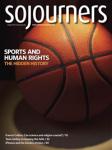Rachel Corrie, a 23-year-old American peace activist, was crushed by an Israeli bulldozer on March 16, 2003, while trying to stop the destruction of Palestinian homes in the Gaza Strip. Israeli military police concluded that her death was accidental, though eyewitnesses claimed she was murdered. Simone Bitton, an Israeli filmmaker living in France, examined the conflicting accounts of Corrie’s death in her documentary Rachel. Becky Garrison, author of The New Atheist Crusaders and Their Unholy Grail and Rising from the Ashes, spoke with Bitton at New York’s Tribeca Film Festival in April, where the film had its North American premiere.
Becky Garrison: What drew you to this story?
Simone Bitton: I am an Israeli citizen, though I live in France now. This story has special significance for us because it was the first time a foreign peace activist protecting Palestinians was killed by the Israeli army. Somehow a red line had been crossed.
On a more personal level, I was moved by the story of this young girl. I’m 53 years old, and I’m at the age when one starts mourning one’s youth and evaluating one’s own present and past commitments. I had been a peace activist since I was young, and I have a deep feeling that my generation has failed. We didn’t achieve anything. The Occupation is more terrible than it used to be.
Corrie’s death received little press, but she still received more coverage than the Palestinian who died the same day.
In general, in the Middle East and a lot of places, the value of life is not the same for the media and the public. The lives of Palestinians aren’t worth much in comparison with the lives of Americans and Israelis. Although I made a film about an American citizen and not the anonymous Palestinian victim, my choice to focus on the American should be questioned in the film. And I think it is.
What difficulties did you encounter?
This film took about three years of very hard work. It was difficult to get to Gaza because of all the restrictions. Once I was in Gaza, I didn’t have to work that hard to convince the Palestinians to talk because so few filmmakers and media people come to ask them to tell their story. It was not easy for some of Rachel’s friends. They were a little bit suspicious, probably because they had been mistreated and misquoted by other journalists, especially when Corrie died.
You never state in the film if you think Corrie was accidently killed or murdered.
In my films, I don’t do a voiceover guiding the spectators, saying “be careful, this one is a liar” or “no, I like this one.” I bring them all the versions at length to expose the complexity not only of this case but of the situation as a whole. Being rigorous in a documentary film doesn’t mean that when you have contradictory events, you are neutral. But it means I have to give to my spectators as many possible points of view, so they can make their own opinion about all these contradictions. Some details are not solved. I’m not a propagandist or an activist. When I come to do a film, I’m a filmmaker.
Why did you find it necessary to show Rachel’s corpse?
We’re talking about the death of a young person. If I don’t want to show this image, then all my work has no sense. I didn’t make this film to make it easy for other people. I made this film to share with them this feeling of scandal that I had. In the film, I talk with one of Rachel’s friends, who took some of the photos. He felt a little guilty, but he didn’t hesitate in taking them because he knew the evidence would be needed. For me, it’s the same. I have a sense not so much of guilt but of great responsibility doing it, but I don’t hesitate. I think Rachel herself would have allowed me to do it, because Rachel and her group went there with their bodies knowing there were risks. Peace activists from all over the world who are doing nonviolent action know that if something happened to them, their image will be in the media because there are cameras everywhere. It’s part of their strategy.
Some people believe Rachel had no business going into Gaza.
The people who are saying those things have no political consciousness. To say that an American citizen has no connection with what’s happening in Palestine is nonsense.
What would you say to other “Rachels” out there?
The important thing they can do is to work where they are and to use the democratic process to change the policy in the region, as well as become more aware of violations of human rights. The biggest human rights violation is depriving the Palestinian people of their independence. You cannot continue to keep accepting all that Israel is doing to the Palestinians. It’s bad for America and it’s bad for Israel. I’m saying this as an Israeli; we don’t need so much of this kind of friendship. Please support the Israelis who are against the occupation.

Got something to say about what you're reading? We value your feedback!
